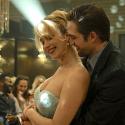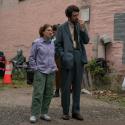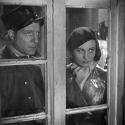“A dirty fairy tale” was one of the encomiums lobbed at The Apartment in June 1960, nine months before it won Billy Wilder and I A L Diamond the Academy Award for Best Original Screenplay and Wilder the Oscars for Best Picture and Best Director. Although The Saturday Review’s influential Hollis Alpert was critically off the mark when he disparaged Wilder’s serious adult comedy, he was right to describe it as a fairy tale. A prince does rescue a princess after an ogre’s cruel treatment of her has caused her to fall into a fatal sleep.
The “dirty” part is more complex. The premise is undeniably sordid. A lowly Manhattan insurance clerk, C C “Bud” Baxter (Jack Lemmon), scales the corporate ladder by loaning out his dingy West 67th Street brownstone apartment to the office philanderers – unpreposessing Mad Men originals – who take their mistresses and pick-ups there for sex and duly recommend him for promotion. The locker-room badinage between these physically unattractive sleazebags is noxious, though of course Wilder, who has often been accused of having his cake and eating it when it comes to dwelling on heinous behaviour before righting wrongs with rushed or sentimental endings, mines their lewd appraisals of women and their mannerisms for laughs, at their expense.
Given that it’s set at the height of the Playboy era, the film itself isn’t what you’d call dirty. If anything, it’s unusually caustic, pre-emptively politically correct even, in its moral disapproval of male predatoriness run amok in and out of the workplace. Remarkably for a film made by men, it empathetically conveys the emptiness and self-disgust felt by a woman hopelessly in love with a man who strings her along so he can fuck her twice a week.
 The suicidal princess is Shirley MacLaine’s seduced and abandoned elevator operator Fran Kubelik (pictured right, with Jack Kruschen and Lemmon), with whom Bud is unrequitedly in love. The ogre is Fred MacMurray’s bland executive (and suburban family man) Jeff Sheldrake, who newly cottons on to the apartment payola scheme into which Bud has stumbled and takes advantage of it to rekindle his affair with Fran. This leads to one of the greatest “reveals” in all of American cinema. Involving the cracked mirror of Fran’s compact, it is too precious to give away here.
The suicidal princess is Shirley MacLaine’s seduced and abandoned elevator operator Fran Kubelik (pictured right, with Jack Kruschen and Lemmon), with whom Bud is unrequitedly in love. The ogre is Fred MacMurray’s bland executive (and suburban family man) Jeff Sheldrake, who newly cottons on to the apartment payola scheme into which Bud has stumbled and takes advantage of it to rekindle his affair with Fran. This leads to one of the greatest “reveals” in all of American cinema. Involving the cracked mirror of Fran’s compact, it is too precious to give away here.
In getting himself into such a situation to further his career, Bud has erred. Though good-natured and courtly towards Fran – her sleeping-pill overdose in the apartment throws them together in a simulacrum of domestic harmony over Christmas – he must find the moral fibre to stop facilitating other men’s affairs, which makes him a pander. In the words of his neighbour Dr Dreyfuss (Jack Kruschen) along the hall, he must learn to “be a mensch”.
The particular irony of Bud’s predicament is that he is profoundly lonely, a womanless, friendless man with apparently only two acquaintances in New York: Dr Dreyfus and his wife (Naomi Stevens), who are scandalised by the number of different women they’ve seen arriving at or leaving his rooms, not realising they’ve come there with other men, and his piles of vodka empties. Shooting in black and white with a Panavision camera, Wilder’s cinematographer Joseph LaShelle emphasised Bud’s solitude in the wide open spaces of his rooms and on the damp Central Park bench where he sits out a night, and acquires a cold, while his place is occupied.
Underscored by Adolphe Deutsch’s poignant musical theme, the loneliness afflicts others, too – Edie Adams’s Miss Olsen, Sheldrake’s embittered secretary, whom he has tormented with his other conquests, and, in a more comic vein, Hope Holiday’s tipsy married barfly, whom Bud, drunk himself, brings home on Christmas Eve. Lemmon, endlessly inventive, MacLaine, and Kruschen were all Oscar-nominated for their performances, and MacMurray (countering his dependable widower-dad in My Three Sons, which began airing the same year) and Adams should have been. I have a soft spot for Miss Olsen: a pretty, vulnerable snoop in silly glasses whose long-delayed act of revenge warrants applause.
Bud demonstrates the use of a tennis racket no bachelor’s kitchen should be without
The Apartment is a writer’s movie’s full of brilliant sleights, such as Bud’s unconscious habit of reiterating what others say, not just expression-wise but opinion-wise (that wonderfully irritating suffix learned from David Lewis’s Mr Kirkeby, smoothest of the ageing roués). Apart from Alexandre Trauner’s Oscar-winning sets – including the vast office space modelled on that in King Vidor’s The Crowd (1928) and achieved through false perspective – the film is visually less arresting than functional. The slick city streets fleetingly evoke Alexander Mackendrick’s New York noir Sweet Smell of Success (1957), but the mood never turns sinister or perverse (except in Fran’s self-confessed romantic masochism). Against that, there are a number of simple sight gags involving pharmacy purchases – Bud’s snotty tissues, nose spray and safety razor – that never get old. He also demonstrates the use of a tennis racket no bachelor's kitchen should be without.
None of the nine films the director had left in him, including the unsexy comedies Irma la Douce (1963, with Lemmon and MacLaine) and Kiss Me, Stupid (1964), were as deft, funny or as moving as The Apartment. Along with Double Indemnity (1944, in which MacMurray first embodied unambiguous lust), Sunset Boulevard (1950) and Some Like It Hot (1959), the movie is indispensable Wilder. All four are a little jaundiced and unsavoury and all flirt, to different degrees, with misogyny. Alone among them, The Apartment shows a tenderness towards its characters that transcends the tawdriness of the context. And if the last two scenes seem more wish-fulfilling than truthful, you have to be a cynic to want something different, conclusion-wise or otherwise-wise.
Bud and Fran at the Christmas Party















Add comment